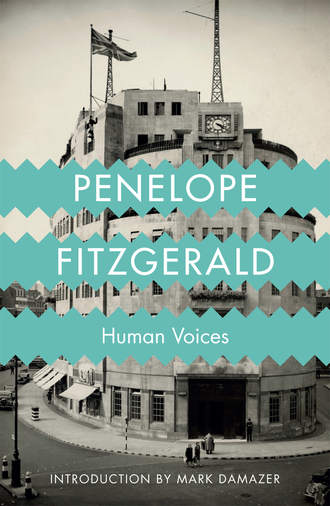
Полная версия
Human Voices
It was headed Lest we forget our Englishry. Sam had disappeared for over two weeks in one of the Wolseleys, pretty infirm even at that time, with an engineer and an elderly German refugee, Dr Vogel – Dr Vogel, cruelly bent, deaf in one ear, but known to be the greatest expert in Europe on recorded atmosphere.
There was not much hope of commonsense prevailing. Dr Vogel, in spite of his politeness and gentle ganz meinerheits, was an obsessive, who had been seen to take the arms of passers-by in his bony grip and beg to record their breathing, for he wished to record England’s wheezing before the autumn fogs began. ‘Have the goodness, sir, to cough a little into my apparatus.’ Sam thought the idea excellent.
The expedition to the English countryside arrived back with a very large number of discs. The engineer who had gone with them said nothing. He went straight away to have a drink. It was probably a misfortune that the Controllers were so interested in the project that they demanded a playback straight away. Usually there was a judicious interval before they expressed any opinion, but not this time.
‘What we have been listening to – patiently, always in the hope of something else coming up – amounts to more than six hundred bands of creaking. To be accurate, some are a mixture of squeaking and creaking.’
‘They’re all from the parish church of Hither Lickington,’ Sam explained eagerly. ‘It was recommended to us by Religious Broadcasting as the top place in the Home Counties. What you’re hearing is the hinges of the door and the door itself opening and shutting as the old women come in one by one with the stuff for the Harvest Festival. The quality’s superb, particularly on the last fifty-three bands or so. Some of them have got more to carry, so the door has to open wider. That’s when you get the squeak.’
‘Hark, the vegetable marrow comes!’ cried Dr Vogel, his head on one side, well contented.
For several weeks the Recorded Programme Department was in danger of complete reorganization, for the BBC could form and re-form its elements with ease. It was put to DPP, in consultation, that although RPD was successfully in charge of hundreds of thousands of pounds’ worth of equipment, and no fault could be found with his technical standing.…
‘You feel that he’s too interested in creaking doors,’ Jeff said.
‘He’s irresponsible.’
‘Oh, I wouldn’t say so.’
‘There was a considerable financial investment in this project, and Brooks was well aware that copies of the recordings were to be buried certain fathoms in the earth as a memorial for future generations.’
‘You could still do that,’ Jeff replied. ‘There mayn’t be any doors that creak by then. Mine doesn’t now.’ All the doors in BH were fitted with self-closing devices of an irritating nature.
It was not Jeff’s habit to soothe, but as usual the case he made for his friend, only just over the borderline of detachment, and gradually becoming more serious, proved effective. Sam never heard of these discussions. He continued like a sleepwalker, who never knows what obstacles are removed, and by what hands, from his path.
And Sam was not the only member of the Corporation who confided in Jeff. That was surprising, in view of the imperturbable surface he presented, which gave back only a stony resonance, truthful and dry, to the complaints of others. But his advice was excellent, and he could be relied upon, as so few could, not to wait for a convenient opening to start on his own grievances. Perhaps he hadn’t any, certainly he admitted to none. His calmness was really recklessness, as of a gambler who no longer felt anything was valuable enough to stake. That in turn was not likely to make him popular. Those who valued his cold judgement when they needed it, very naturally resented it when they didn’t. To see the Director of Programme Planning miscalculate might have been a relief, but during the first nine months of the war no hint of such a thing arose – never, until the affair of General Pinard.
‘You’ll get your boy back, then,’ said Della to Lise. A strong line was best, in her opinion. Everyone knew that Lise considered herself engaged and that Frédé was some kind of electrician with the French 1st Army. The way things were going they’d have to bring the French over here, there was nowhere else for them to go.
‘But that will be quite impossible,’ said Tad, demonstrating with his map. ‘You underestimate the obstacle of the English Channel.’
‘In that case, if you want my advice, you’d do best to forget him,’ said Della. ‘After all, he never gave you a ring, did he?’
Lise had not proved any better at her work than Della, which made some sort of bond between them.
Vi’s merchant seaman wrote making apparent references to home leave, but a good deal of his letter had been blacked out by the censor. What a job having to go through other people’s personal letters, Vi thought, they must feel uncomfortable, you had to pity them.
On June 10 1940 the French Government admitted that Paris could not be defended, and left for Bordeaux. Between the débandade and de Gaulle’s arrival on the 17th, there was a bizarre moment of hope when the Government learned that General Georges Pinard had escaped to London, flying his own light aircraft, and bringing with him nothing but a small valise and one junior officer. He went straight to the Rembrandt Hotel.
Historians have not yet decided – or rather, they have decided but not agreed – as to who sent the General on his desperate mission. Certainly no-one could have been more welcome. Whereas de Gaulle was practically unknown in Britain, Pinard was instantly recognizable, with his coarse silvery moustache, the joy of worn-out cartoonists, and his nose broken by a fall from a horse and flattened out of its French sharpness. His name was one of the few that the public knew well and it created its own picture.
The General was a peasant’s son from the flattest, wettest and most unpicturesque part of France, where the provinces of Aisne and Somme join. Born in 1869, he grew up with the Prussian occupation; the army rescued him from hoeing root vegetables, and he rose at a moderate speed through the ranks. Improbable as it seemed, he was a romantic, a Dreyfusard and a devotee of the aeroplane – indeed, his lectures on the importance of airpower delayed his promotion by several years. However, he cared nothing for Empire, nothing for impossible ambitions, only for the stubborn defence of the solid earth of his country. In the Great War, he was with one of the only two divisions not affected by the mutiny of 1917. He always slept excellently, and it was said that he had to be wakened by his orderly before every battle.
When the Ecole Supérieure de Guerre was reopened in 1919, Pinard was one of the first to be appointed, and was looked upon as a sound man, a counterweight, with his peasant blood, to the impossible de Gaulle. In 1940, in spite of his advanced age, he had managed to get himself the command of the 5th Armoured Division, which, in the middle of May, had made a last counterattack against the German advance.
A romantic, then, though limited by earth and sky, but nothing in his military career explained his curious fondness for the English. This could be traced to his shrewd marriage with a very rich woman, addicted, as Pinard was himself, to racehorses. Between the wars he had become a familiar figure at bloodstock sales, and at Epsom and Ascot. Much photographed at every meeting, he was always cheerful, and most important of all, nearly always a loser. That was the foundation of his great popularity over here, something he had never attained in France. On his wife’s money, he became an Anglophile. He learnt to love because he was loved, for the first time in his life.
At half-past eight on the 14th of June the Director General’s office told DPP that General Pinard was going on the air as soon as it could be arranged. ‘He wants to broadcast to the English nation and it seems it’s a matter of great urgency. It’s all been agreed.’
‘Well, the evening programmes must shove over a bit,’ said Jeff. ‘I’ll see to it.’
‘It’s more than that. We want you down in the studio.’
‘What for?’
‘Don’t you speak fluent French?’
‘Well?’
‘He wants you there when Pinard comes.’
‘He speaks perfectly good English, with a strong French accent, which is exactly what you want.’
‘The point is this – the War Office is sending someone and so is the FO, and the DG and DDG don’t think it will look well if we can’t produce a French speaker from our top level in BH.’
‘What do you want me to say?’
‘Oh, it might be a few sentences of greeting. Some hospitality may be considered appropriate. I suppose there’d better be some absinthe, isn’t that what they drink?’
‘The General prefers cognac,’ Jeff said.
‘Have you met him, then? That might be extremely useful.’
‘I met him in a dugout, behind a village called Quesnoy en Santerre, twenty-three years ago.’
‘I’ve never heard you talk about your war experiences before, Haggard.’
‘This wasn’t an experience. We were supposed to be taking over from the French, then it turned out that we were retreating. I was Mess Officer and I stayed to see if the French had left any brandy behind, they did sometimes. Pinard came back with exactly the same idea in mind. He was a captain then. I don’t flatter myself that he’ll remember this incident, by the way.’
‘I see, well, that isn’t really … did he seem to be a good speaker?’
‘He didn’t say very much on that occasion.’
‘In a sense it hardly matters whether he is or not. It’s a morale talk, he’s expected to fly on to Morocco to organize the resistance there, he’ll want to encourage himself as well as us.’
General Pinard arrived brushed and shining, to the relief of the Talks Producer, who believed, in the old way, that appearances were projected through the microphone. His silent young aide wished to accompany him into the studio, but was detained in the rather crowded continuity room. Pinard sat down behind the glass panel, his eyes resting for a moment upon everybody present.
‘He won’t wear headphones,’ the Talks Producer told Jeff. ‘It seems he doesn’t like them. He prefers to go ahead on a hand cue.’
‘I don’t think we should grudge him anything.’
The canteen’s brandy, Martell 2 Star, left over from Christmas, was brought out. The General raised his hand in a gesture of mild, but emphatic, refusal. That meant that no-one could have any – a disappointment to everybody except Talks, whose allocation for the month had already run out. The brandy would now do for the Minister of Coastal Defence, due later that evening. But these considerations faded as the General’s presence was felt. He waited in immaculate dignity. Behind him lay France’s broken armies.
A piece of paper was put in front of him. He looked at it, then moved it to one side.
In the continuity studio it was hardly possible to move. The War Office’s Major, the Foreign Office’s liaison man, sat awkwardly on high stools. The young French aide stood warily on guard. The Acting Deputy Director General suddenly came in through the soundless door to join them. DPP leant in a corner, looking up at the ceiling.
‘Don’t forget it’s your duty to put everyone at their ease,’ he said to the Talks Producer.
‘He didn’t look at my notes and suggestions. We need a run-through.’
‘You’ve no time. I did what I could for you, but we can’t alter the nine o’clock. You’re on in forty-three seconds.’
The producer pressed his switch.
‘How would you like to be introduced, General?’
‘I don’t know,’ Pinard replied. ‘I am in uniform, but I am a soldier without a post, an officer without authority, and a Frenchman without a country.’
‘The English people know your name quite well, sir.’
‘Use it if you wish. But make it clear that I am speaking to them as an individual. I have something to say from the heart.’
‘How long is this going to take?’ asked the programme engineer. No-one knew, it was open-ended. The PE’s face tightened with disapproval.
‘My dear friends,’ General Pinard said, ‘many persons who have occupied the stage of history have been forgiven not only their mistakes, but their sins, because of what they did at one moment only. I pray that for me, this will prove to be the moment.’
It was a quiet, moving, old man’s voice, with a slight metallic edge.
‘It gives me a strange feeling to speak to you this evening, and even stranger, after all that has happened in the past few weeks, to think that I should be speaking the truth, and that so many of you should be willing to hear it. Old soldiers like to tell stories, and old generals most of all. That kind of story is called a giberne.’
The producer passed a note: Should we translate at the end? ADDG wrote: I think a few untranslated French words give the right atmosphere. Jeff wrote: Don’t worry, he’s not going to tell it anyway.
‘This evening I am not here to indulge myself with a giberne. I have come to tell you what I saw yesterday, and what you must do tomorrow.
‘But perhaps you will say to yourselves, “I am listening to a Frenchman.” He is French, and I am English and I don’t trust him, any more than I would have done these past five hundred years, let them make what alliances they will. And today above all I don’t trust him, this evening I don’t trust him, because his country has been defeated. You know that every road leading to the south is impassable, every road is crowded not only with troops in retreat, but with families on the move, the old, the weak and the very young, the bedding, the cooking-pots, the scenes to which we have become so terribly accustomed since Poland fell.’
‘What’s this about cooking-pots?’ said the engineer to his JPE. ‘He may be going to break down. Watch the level.’
‘So, to repeat, you will think: I shan’t trust this man.… And we French, do we trust the English? The answer is: not at all. In the past weeks, most of all in the past twenty-four hours, I have heard you called many hard names, I don’t only mean by colleagues in the Conseil de Guerre but every soldier and every little shopkeeper on the road. They say that you led us unprepared into war with Germany and that having done so you have deserted us. And perhaps “in the misfortunes of our friends there is something not displeasing to us”. Well, in that case you must be satisfied. We are ruined, and we blame it on you.
‘Why then when I began to speak to you did I call you “friends”? That is a word that means so much that I understand no language is without it. I use it to you, and I mean it. The truth is that I am here this evening, in spite of all I have said, because I care deeply for England and the English.
‘Well, is this nonsense, or is the old man weak in the head? No more unsuitable task could be imagined than for a general, worse still, an aged general, to show his feelings. And those who hold power in France at the moment did not wish me to come. They tried to prevent me, but I came.’
Without warning, General Pinard’s voice rose to the level of the parade ground, and the engineer, caught on the hop, allowed it to blast fifteen million listeners.
‘But, believe me, I am not here to flatter you! That would not be the duty of friendship. Dear listeners, dear Englishmen and women, dear people of the green fields, the streets and the racecourses that I know so well – I have seen my nation lose hope, and I say to you now that there is no hope for you either, ne vous faîtes pas aucune illusion, you have lost your war. I tell you – do not listen to your leaders – neither those who are ready, as they always have been, to depart from these shores to Canada, nor to the courageous drunkard whom you have made your Prime Minister.’
The Talks Producer stared round from face to face, his hand on the censor switch, waiting for orders. The Foreign Office confronted the War Office.
Конец ознакомительного фрагмента.
Текст предоставлен ООО «ЛитРес».
Прочитайте эту книгу целиком, купив полную легальную версию на ЛитРес.
Безопасно оплатить книгу можно банковской картой Visa, MasterCard, Maestro, со счета мобильного телефона, с платежного терминала, в салоне МТС или Связной, через PayPal, WebMoney, Яндекс.Деньги, QIWI Кошелек, бонусными картами или другим удобным Вам способом.







